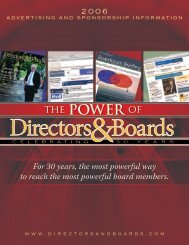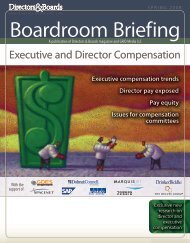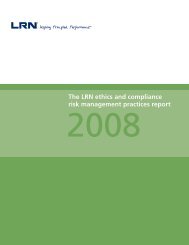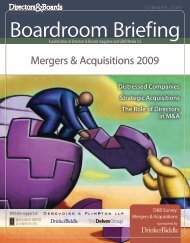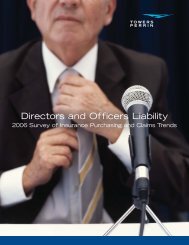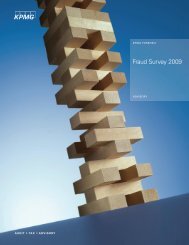Boardroom Briefing: Mergers & Acquisitions - Directors & Boards
Boardroom Briefing: Mergers & Acquisitions - Directors & Boards
Boardroom Briefing: Mergers & Acquisitions - Directors & Boards
Create successful ePaper yourself
Turn your PDF publications into a flip-book with our unique Google optimized e-Paper software.
in fact, focus on the value of talent,<br />
regardless of which organization it<br />
comes from.<br />
6. Is the merger of leadership<br />
cultures important to the success of<br />
the transaction?<br />
For example, the acquiring company<br />
may need the target company’s help<br />
in entering unfamiliar markets or<br />
for a jolt of entrepreneurial energy,<br />
requiring the retention of key leaders<br />
who created the original culture<br />
at the target company. Similarly,<br />
retaining key leaders who embrace<br />
the integrated company and can serve<br />
as supporters and role models for their<br />
colleagues is important.<br />
7. What kind of leadership team<br />
will the company require post<br />
transaction?<br />
But the real question is not how much the process<br />
costs, but how much value is lost by not making a<br />
meaningful effort to leverage the best talent.<br />
9. Will a “talent committee” be<br />
formed to specifically focus on the<br />
people aspect of the transaction?<br />
Forming such a committee, with<br />
specific tasks and responsibilities, will<br />
provide the focus this process needs.<br />
The makeup of such a committee,<br />
including the degree of board<br />
involvement, if any, is important to<br />
ensure that optimal results emerge<br />
from the process.<br />
10. What will the company do to<br />
“recruit” executives to join the<br />
merged company?<br />
the right tone and to establish trust<br />
in the new organization. Ideally,<br />
the process itself, by virtue of being<br />
objective, transparent and meritbased,<br />
will further establish trust.<br />
In our experience, an objective and<br />
comprehensive process leads to higher<br />
retention. Key executives appreciate<br />
the effort and professional courtesy<br />
and often decide to make a renewed<br />
commitment to the new company.<br />
12. What processes are in place to<br />
ensure the effective integration of<br />
those selected into one cohesive top<br />
team and leadership structure?<br />
The level of integration required<br />
in most M&A situations today<br />
typically calls for highly participative<br />
teamwork, which can be a dramatic<br />
departure in style and substance for<br />
one or both predecessor companies.<br />
8. Does our company have the<br />
resources, time, expertise and—<br />
perhaps most important—the<br />
objectivity to do a comprehensive<br />
talent assessment itself?<br />
Management, in reviewing a few<br />
resumes and conducting some<br />
interviews with executives of the<br />
target company, may believe that<br />
an adequate assessment process is<br />
in place. But in reality, these halfhearted<br />
efforts often lack rigor and<br />
certainly lack objectivity. Moreover,<br />
most companies lack the personnel,<br />
the experience and the capabilities<br />
for undertaking large-scale talent<br />
assessments. Inevitably, the few<br />
resources that are available are often<br />
stretched thin and focused on other<br />
aspects of the transaction.<br />
Having executives in the target<br />
company “apply” for senior positions<br />
in the merged organization flies in the<br />
face of experience. Senior executives<br />
typically don’t apply, they must be<br />
recruited. Keeping the most talented<br />
people may require offering them<br />
retention packages as good as or better<br />
than their severance packages. In<br />
our experience, boards often have a<br />
difficult time accepting this idea, but<br />
again it’s an issue of creating longterm<br />
value for the acquiring company.<br />
Similarly, retention efforts should<br />
be extended through the early postmerger<br />
integration period to make sure<br />
that high potentials don’t leave during<br />
this often stressful transition period.<br />
11. What is the communication plan<br />
around the executive assessment and<br />
selection process?<br />
Candid communication about<br />
the process, including objectives,<br />
timing, process management, team<br />
membership and selection criteria<br />
provides an early opportunity to set<br />
Successful post-merger integration<br />
of leadership talent sets the tone for<br />
longer-term success. New team startup,<br />
new leadership operating styles<br />
and new decision-making structures<br />
require attention and support but are<br />
often neglected.<br />
These questions, or questions<br />
like them, can help boards satisfy<br />
themselves that management has an<br />
adequate plan in place to extract the<br />
full value of the human capital in<br />
the deal. Often, companies that have<br />
a record of successful M&A activity<br />
already have a proven process in<br />
place. Companies that lack such a<br />
process can create one, assuming<br />
they have the resources and the<br />
expertise to do so, or they can retain<br />
an independent advisor with expertise<br />
and experience in conducting an<br />
objective assessment process rapidly<br />
and rigorously. Given the potential<br />
value at stake, the selection of such<br />
advisors on the human capital side is<br />
as important as the selection of the<br />
(continued on page 49)<br />
2 0 B o a r d r o o m B r i e f i n g : M e r g e r s & A c q u i s i t i o n s


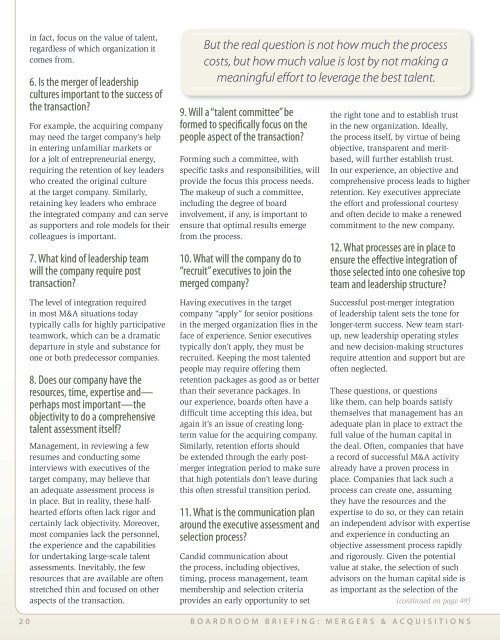
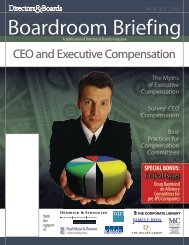
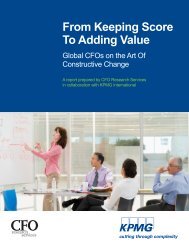
![[link to PDF] for a copy of the briefing paper - Directors & Boards](https://img.yumpu.com/43729022/1/190x245/link-to-pdf-for-a-copy-of-the-briefing-paper-directors-boards.jpg?quality=85)
